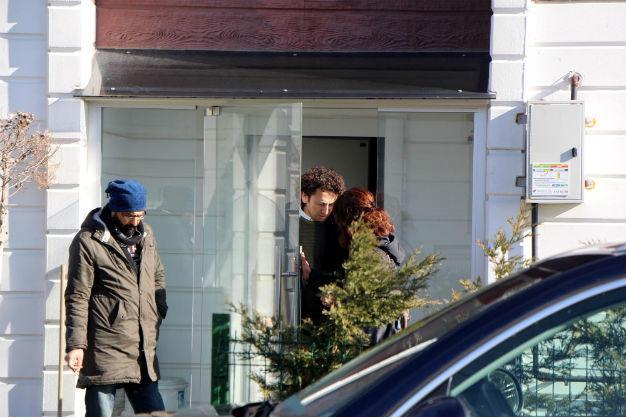18 academics detained, over 130 face criminal charges amid accusations by president of ‘terrorist propaganda’
ISTANBUL

DHA Photo
Turkish police have detained at least 18 academics who signed a petition calling for an end to military operations in southeastern Anatolia, while more than 130 academics are facing criminal charges. The moves come just days after President Recep Tayyip Erdoğan slammed the signatories for making “terrorist propaganda.”
Universities and prosecutor’s offices across the country started to launch probes into some of the 1,128 local and international academics and intellectuals who fall within the state’s jurisdiction, arguing that the petition went beyond the limits of academic freedoms.
In a dawn operation in the northwestern province of Kocaeli on Jan. 15, police raided the houses of 19 academics and detained 15. Provincial police head Levent Yarımel told the press a detention warrant had been issued for a total of 21 academics in the city.
In the northwestern province of Bursa, meanwhile, three academics were also detained, Anadolu Agency reported.
Speaking in Sultanahmet after Friday prayers on Jan. 15, President Erdoğan again denounced the signatories of the document, who included U.S. philosopher Noam Chomsky, saying that “those who do not want to take part in politics in parliament should dig trenches or go to the mountains.”
“Our nation should see who is who. Being a professor does not make someone an intellectual. These are the darkest of people. They are cruel people, because those who ally with cruelty are themselves cruel,” Erdoğan said on Jan. 15, referring to the detention of academics.
Meanwhile, the Anatolian, Istanbul and Bakırköy chief public prosecutors also launched investigations against at least 123 academics employed by universities in Istanbul. Anadolu initiated probes on 82 academics and Bakırköy on 41 academics while public prosecutor of Istanbul did not disclose a number.
Some of the academics employed by universities outside of Istanbul are also facing charges as public prosecutor’s offices in Bartın, Diyarbakır, Kayseri, Mardin and Samsun also announced that probes would be launched against academics that have signed the petition, although a clear number was not provided to the press.
According to reports, the academics are being charged with violating the controversial Article 301 of the Turkish Penal Code, according to which it is illegal to insult the Turkish nation, the state of the Turkish Republic or the Grand Assembly of Turkey and the state’s judicial institutions. The academics are also accused of “terrorist propaganda” and of “inciting hatred and enmity.”
This view was reiterated early on Jan. 15 by Turkish Foreign Minister Mevlüt Çavuşoğlu who claimed no country would consider “supporting or collaborating with a terror organization” as freedom of expression, implying the petition aimed at supporting the outlawed Kurdistan Workers’ Party (PKK).
“There is no difference between supporting terror financially or politically,” Çavuşoğlu argued, underlining Turkey has been going through a “sensitive” period in its history.
The president’s call for action of legal institutions and university senates, coupled by criticisms of Justice and Development Party (AKP) government officials, led to a series of administrative inquiries by universities which employ some of the academics in question.
At least 41 academics are facing, among other punishments, suspension and dismissal. This figure does not include the academics whose number has so far been disclosed only as “a group of” academics by Çukurova and Gediz universities.
In stark contrast with the AKP, Turkey’s main opposition Republican People’s Party (CHP) strongly criticized the detentions, arguing the move came from Erdoğan’s instructions to the judiciary.
“The steps taken by the judiciary and some universities that regarded President Erdoğan’s statements as an order on 1,128 academics who signed a petition titled ‘We won’t be part of this crime’ by the ‘Academics for Peace Initiative’ constitute a new dark stain on Turkish democracy,” read a statement issued by the party assembly of the Republican People’s Party (CHP) on Jan. 15.
The Istanbul Chamber of Medicine also raised its voice against the detention of academics and announced that it would hold a press conference in protest at the raids.
The investigation and the detentions come soon after Turkey’s president slammed the petition’s signatories, arguing the human rights violations in the southeast are being committed by the outlawed Kurdistan Workers’ Party (PKK) militants and not the Turkish state.
“Despite all of these facts, this crowd, which calls itself academics, accuses the state through a statement. Not only this, they also invite foreigners to monitor developments. This is the mentality of colonialism,” he said. Likening today’s situation with the Turkish War of Independence, Erdoğan said the country was again facing “treason” from “so-called intellectuals.”
Erdoğan also touched upon the issue following a visit to Sultanahmet Square, where an Islamic State of Iraq and the Levant (ISIL) suicide bomber killed 10 German tourists on Jan. 12, underlining that there was no different between “oppressors and the supporters of oppressors.”
















